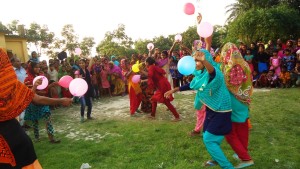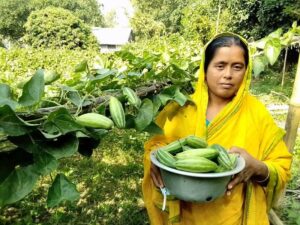By Silvanus Lamin
The Green Coalition is a network initiated by BARCIK in 2024 to strengthen the environmental movement in Bangladesh. It brings together community members, youth, students, women, development activists, academics, environmental defenders, and even local elected representatives. BARCIK has already formed committees at district and sub-district levels to expand the reach and impact of this network.
As a development and research-based organization, BARCIK has been working closely with local communities in remote areas since its inception. One of its key focuses has been documenting indigenous knowledge to highlight its relevance in mainstream development. By recognizing and respecting the wisdom of grassroots communities, BARCIK has documented numerous indigenous practices that help these communities adapt to the impacts of climate change. However, these practices are often sidelined or excluded from mainstream development agendas, which tend to follow top-down approaches that marginalize local voices. In fact, some modern development interventions have directly contributed to biodiversity loss and environmental degradation. Energy-intensive agriculture, monocropping, and unplanned infrastructure development such as encroaching on water bodies and felling trees have often caused more harm than good. These so-called “development” efforts have, in many cases, become environmental disasters. On the other hand, the insatiable greed of human beings has endangered nature’s many creations such as trees, vines, forests, rivers, and reservoirs. Those with economic power and influence bear a significant responsibility for this destruction.
Such unsustainable practices have accelerated climate change, causing erratic seasonal changes that disrupt agricultural cycles and hinder socio-economic development. Farmers now struggle to grow crops in these changing conditions. Bangladesh faces annual natural disasters like floods, river erosion, salinity, cyclones, tidal surges, and waterlogging, resulting in significant losses and human suffering.
The Need for Environmental Protection and Climate Justice
In this changing climate, the protection of the natural environment, ecosystems, and biodiversity and the establishment of climate justice, has become imperative. Bangladesh is among the most climate-vulnerable countries in the world. In the pursuit of higher yields, croplands are saturated with chemical fertilizers and pesticides, which ultimately degrade soil fertility and productivity. Meanwhile, industrial waste pollutes water bodies, and the encroachment of rivers and canals for construction projects has led to the disappearance of these water sources from the national landscape. This has caused the extinction of many fish and aquatic species, which are vital to both human and ecological food chains. Additionally, the excessive use of agrochemicals has led to the extinction of beneficial birds, insects, spiders, and bees. It is estimated that over Taka 5000 crores worth of agrochemicals are sold annually in Bangladesh. Alarmingly, even banned substances like Carbofuran, which was officially prohibited in 2016 due to its harmful impact on human health and soil fertility, are still being used in crop fields (Somokal, February 13, 2024). The increased use of such poisons has contributed to a surge in non-communicable diseases, including cancer.
Another major concern is the extraction of topsoil for brick-making. The topsoil contains organic matter, humus, and earthworms which are essential for maintaining soil fertility. According to agricultural scientists, once removed, it can take years for soil to regenerate. This practice severely compromises the long-term productivity of farmlands.
BARCIK’s Response: Mobilizing through the Green Coalition
BARCIK aims to stop the destruction of biodiversity and environmental degradation through its development interventions. However, this task is too vast for one organization alone. Collaborative action is essential and this is where the Green Coalition plays a vital role. Members of the Green Coalition are conscious of their responsibilities and are committed to collective action for protecting the environment.
The Coalition’s objectives include:
- Preventing environmental destruction and degradation.
- Safeguarding all elements of nature, including plants, animals, and ecosystems.
- Combating pollution of air, soil, and water.
- Promoting the interdependence and mutual respect of all living beings.
- Advocating for ecological justice.
- Organizing social awareness campaigns and movements for natural resource regeneration.
- Advancing food sovereignty through agroecological practices.
- Building a strong social movement at local, national, and regional levels for climate justice.
To serve its objectives the Green Coalition works as information hub, educator, persuader and entertainer. Below on how this network works is described.
The Green Coalition as an Information Hub
Information is power, especially in the fight against environmental degradation. Without access to accurate, timely, and context-specific information, communities are left disempowered and unable to take meaningful action to protect their surroundings. The Green Coalition serves as an information hub, collecting, curating, and disseminating knowledge on environmental laws, climate change policies, biodiversity conservation, and emerging ecological threats across Bangladesh.
This hub plays a vital role in enabling people to understand the root causes and consequences of environmental destruction, as well as the legal and policy mechanisms available to address them. The Green Coalition gathers data through research, investigative field studies, participatory observations, and extensive literature reviews. It also documents locally rooted and time-tested practices that promote environmental sustainability, such as agroecological farming, nature-based solutions, organic gardening, and indigenous knowledge systems related to climate adaptation and natural resource management. By sharing this valuable knowledge with communities, civil society actors, and other stakeholders, the Coalition fosters a culture of environmental awareness and informed activism. In doing so, it helps to build a knowledge-based movement, empowering individuals and groups to take credible, evidence-backed action for the preservation and restoration of ecosystems and biodiversity.
The Green Coalition as an Educator
People, even those deeply connected to nature, often lack access to the technical knowledge and policy frameworks necessary for effective environmental advocacy. Many remain unfamiliar with key national and international documents such as the Bangladesh Climate Change Strategy and Action Plan (BCCSAP), the National Adaptation Plan (NAP), environmental laws and acts, and global agreements like the Convention on Biological Diversity (CBD). There is also limited understanding of sustainable practices like agroecology, climate change adaptation, and ecosystem-based resilience strategies.
Recognizing this gap, the Green Coalition takes on the role of an educator, helping people connect their environmental experiences with broader policy narratives and frameworks. Through workshops, trainings, dialogues, and awareness sessions, it builds the capacity of community members, youth, women, development workers, and local leaders. These sessions are facilitated by experienced professionals, including academics, researchers, farmers with practical knowledge, and senior BARCIK staff, who share insights in accessible and participatory ways. This educational role not only enhances public understanding of biodiversity and environmental policy but also strengthens local efforts to protect and manage natural resources. Educated and informed citizens are more likely to become agents of change, actively engaging in advocacy, policy dialogue, and on-the-ground action to reverse environmental degradation and ensure a sustainable future for all life forms.
Green Coalition as a Persuader
Equipped with information and a solid understanding of environmental protection, climate change, and relevant national and international policies, the members of the Green Coalition actively engage in campaigns and evidence-based advocacy. The goal is to sensitize and influence policymakers and state authorities to take meaningful action for environmental protection. To achieve this, the Green Coalition organizes seminars, symposiums, public discussions, and sharing meetings where state officials and other stakeholders are invited.
These platforms are used to present research findings, community observations, and real-life accounts of environmental degradation. Such direct interactions allow policymakers to better understand the long-term consequences of unplanned development and the ongoing loss of biodiversity across the country. In addition to public events, the Coalition also submits memoranda, policy briefs, and research reports to relevant government departments, urging the inclusion of environmental priorities in planning and decision-making. Green Coalition arranges press conference in national and regional levels sharing alarming data and stories about environmental decline, creating a sense of urgency among citizens and institutions alike. Through these activities, the Green Coalition seeks to generate public pressure on authorities to either introduce new policies or ensure the effective enforcement of existing ones. The advocacy emphasizes that safeguarding nature is not just an environmental issue it is a matter of national well-being. In this way, the Green Coalition acts as a strong and strategic persuader, motivating both state actors and society at large to protect and restore the natural environment.
Green Coalition as an Entertainer
People across all walks of life find joy and peace in nature. From the chirping of birds and the sight of wild animals to the greenery of forests, herbs, uncultivated plants, and diverse flora and fauna, all these natural elements bring emotional and psychological comfort to human lives. Nature lovers and everyday citizens alike seek refuge in natural landscapes during vacations, visiting forests, mountains, rivers, and seas to reconnect with the environment and escape the stress of daily life. The beauty of nature entertains, heals, and inspires a sense of wonder and gratitude. One of the important goals of the Green Coalition is to restore and protect this natural beauty by reviving biodiversity and conserving the ecosystems that support it.
The Coalition promotes community-led eco-tourism, agroecological farming, and the revitalization of indigenous knowledge and practices, all of which play a crucial role in ecological restoration and sustainable living. These initiatives not only empower communities and build environmental resilience but also help to bring back the natural charm that once defined rural and wild landscapes. If these efforts are successfully expanded and replicated across the country, they will significantly contribute to restoring the natural beauty of Bangladesh. In doing so, the Green Coalition enables future generations to enjoy, celebrate, and be entertained by the wonders of a thriving natural environment.




